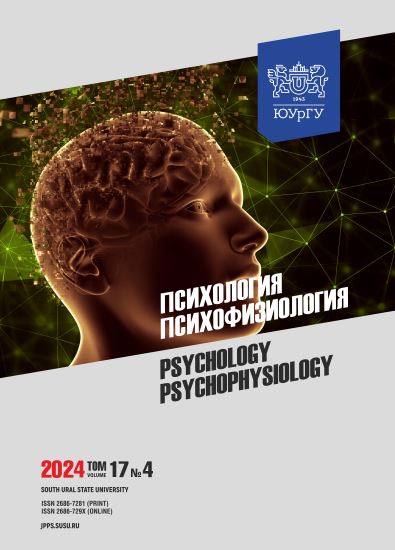The use of video games with complex visual-spatial tasks for reducing the risk of re-traumatization during systematic desensitization in PTSD treatment
Abstract
Introduction. Post-traumatic stress disorder (PTSD) remains a significant clinical challenge, particularly in reducing the risk of re-traumatization during cognitive-behavioral therapy. Systematic desensitization, a core component of PTSD treatment, often faces limitations in effectively managing intrusive memories. This study suggests that modern digital technologies can effectively contribute to reducing the negative consequences of re-traumatization. Aims. This paper aims to investigate the efficacy of using video games with complex visual-spatial tasks as an adjunctive intervention to reduce the risk of re-traumatization during systematic desensitization in PTSD treatment. Materials and methods. The study involved 32 male combat veterans diagnosed with PTSD (aged 29–52). The Impact of Event Scale (IES) (Horowitz M. J., Wilner N. et al.) and the Mississippi Scale for Combat-Related Posttraumatic Stress Disorder (M-PTSD) (Keane T.M., Caddell J.M., Taylor K.L.) were used to assess PTSD symptoms. Statistical analysis was performed using the Wilcoxon T-test and Mann–Whitney U-test (StatplusPro24). Results. Compared to the control group, participants in the experimental group showed significant reductions in intrusive symptoms, both in terms of frequency and intensity, following 15-minute Tetris sessions after systematic desensitization. Conclusion. These findings suggest that video games with complex visual-spatial tasks may effectively reduce the risk of re-traumatization during PTSD treatment.
Downloads
References
2. Gnezdilov G.V., Kiselev V.V., Gnezdilova M.G. Features of psychorehabilitation work with combatants with post-traumatic stress disorder (PTSD)] Chelovecheskii kapital = Human capital. 2023;11-2(179):78–89. (in Russ.). DOI: 10.25629/HC.2023.11.37
3. Carlson K.F., Kehle S.M., Meis L.A. et al. Prevalence, assessment, and treatment of mild traumatic brain injury and posttraumatic stress disorder: a systematic review of the evidence. The Journal of head trauma rehabilitation. 2011;26:103–115. DOI: 10.1097/HTR.0b013e3181e50ef1
4. Stefanovics E.A., Potenza M.N., Pietrzak R.H. PTSD and obesity in US military veterans: Prevalence, health burden, and suicidality. Psychiatry research. 2020;291:113242. DOI: 10.1016/j.psychres.2020.113242
5. Nose M., Ballette F., Bighelli I. et al. Psychosocial interventions for post-traumatic stress disorder in refugees and asylum seekers resettled in high-income countries: Systematic review and meta-analysis. PLoS One. 2017;12(2):e0171030. DOI: 10.1371/journal.pone.0171030
6. Dominguez S.K., Matthijssen S.J.M.A., Lee C.W. Trauma-focused treatments for depression. A systematic review and meta-analysis. PLoS One. 2021;16(7):e0254778. DOI: 10.1371/journal.pone.0254778
7. Amano T., Duvarci S., Popa D., Paré D. The fear circuit revisited: Contributions of the basal amygdala nuclei to conditioned fear. Journal of Neuroscience. 2011;31(43):15481–15489. DOI: 10.1523/JNEUROSCI.3410-11.2011.
8. Koch S.B.J., van Zuiden M., Nawijn L. et al. Aberrant resting-state brain activity in posttraumatic stress disorder: A meta-analysis and systematic review. Depression Anxiety. 2016;33(7):592–605. DOI: 10.1002/da.22478
9. Lyoo I.K., Kim J.E., Yoon S.J. et al. The neurobiological role of the dorsolateral prefrontal cortex in recovery from trauma: Longitudinal brain imaging study among survivors of the South Korean subway disaster. Archives Of General Psychiatry. 2011;68(7):701–713. DOI: 10.1001/archgenpsychiatry.2011.70.
10. Rusanovsky V.V., Tadtaeva Z.G., Potemkina K. N., et al. Actual pharmacotherapy for post-traumatic stress disorder (PTSD). Universum: meditsina i farmakologiya = Universum: Medicine and Pharmacology. 2022;1(84):22–26. (in Russ.).
11. Simpson T.L., Rise P., Browne K.C. et al. Clinical presentations, social functioning, and treatment receipt among individuals with comorbid life-time PTSD and alcohol use disorders versus drug use disorders: findings from NESARC-III. Addiction. 2019;114(6):983–993. DOI: 10.1111/add.14565
12. Hien D.A., Morgan-López A.A., Saavedra L.M. et al. Project harmony: a meta-analysis with individual patient data of behavioral and pharmacologic trials for comorbid posttraumatic stress, alcohol and other drug use disorders. American Journal of Psychiatry. 2023;180(2):155–166. DOI: 10.1176/appi.ajp.22010071.
13. Simpson T.L., Kaysen D.L., Fleming C.B. et al. Cognitive Processing Therapy or Relapse Prevention for comorbid Posttraumatic Stress Disorder and Alcohol Use Disorder: A randomized clinical trial. PLoS One. 2022;17(11):e0276111. DOI: 10.1371/journal.pone.0276111.
14. Vinsky A.A., Markelov V.V., Opletin E.V., Klishin I.V. Traumatic traces of military conflicts: Post-traumatic stress disorder among veterans and ways of support them. Vestnik UGMU = Bulletin of USМU. 2024;2:53–60. (in Russ.).
15. Iyadurai L., Blackwell S.E., Meiser-Stedman R. et al. Preventing intrusive memories after trauma via a brief intervention involving Tetris computer game play in the emergency department: a proof-ofconcept randomized controlled trial. Molecular Psychiatry. 2018;23:674–682. DOI: 10.1038/mp.2017.23
16. Eames C., OConnor D. The role of repetitive thinking and spirituality in the development of posttraumatic growth and symptoms of posttraumatic stress disorder. PLoS One. 2022;17(8):e0272036. DOI: 10.1371/journal.pone.0272036.
17. Taylor Miller P.G., Sinclair M., Gillen P., McCullough J.E.M., Miller P.W., Farrell D.P., et al. Early psychological interventions for prevention and treatment of post-traumatic stress disorder (PTSD) and post-traumatic stress symptoms in post-partum women: A systematic review and meta-analysis. PLoS One. 2021;16(11):e0258170. DOI: 10.1371/journal.pone.0258170
18. Loschinin G.A. To the issue of the etiology of posttraumatic stress disorder and complex PTSD. Lichnost v menyayushchemsya mire: zdorove, adaptatsiya, razvitie = Personality in a changing world: health, adaptation, development. 2021;9(2):125–132. (in Russ.). DOI 10.23888/humJ20212125-132.
19. Butler О., Herr K., Willmund G. et al. Trauma, treatment and Tetris: video gaming increases hippocampal volume in male patients with combat-related posttraumatic stress disorder Journal of Psychiatry and Neuroscience. 2020;45(4):279–287. DOI: 10.1503/jpn.190027
20. Horsch A., Vial Y., Favrod C. et al. Reducing intrusive traumatic memories after emergency caesarean section: a proof-of-principle randomized controlled study. Behaviour Research and Therapy. 2017;94:36–47. DOI: 10.1016/j.brat.2017.03.018.
21. Holmes E.A., James E.L., Kilford E.J. et al. Key steps in developing a cognitive vaccine against traumatic flashbacks: visuospatial Tetris versus Verbal pub quiz. PLoS One. 2010;5(11):e13706. DOI: 10.1371/journal.pone.0013706
22. Holmes E.A., James E.L., Coode-Bate T. et al. Can Playing the Computer Game Tetris Reduce the Build-up of Flashbacks for Trauma? A Proposal from Cognitive Science. PLoS One. 2011;4(1):e4153. DOI: 10.1371/journal.pone.0004153
23. Barnes S., Prescott J. Empirical Evidence for the Outcomes of Therapeutic Video Games for Adolescents with Anxiety Disorders: Systematic Review. JMIR Serious Games. 2018. Feb 28;6(1):e3. DOI: 10.2196/games.9530
24. Tudupova T.T., Smolyankin V.V. The use of video games with high visual- spatial requirements for correcting the prewarning anxiety of athletes of contact sports. Psikhologiya obucheniya = Psychology of education. 2023;2:111–119 (in Russ.).
References on translit
-Copyright (c) 2024 Psychology. Psychophysiology

This work is licensed under a Creative Commons Attribution-NonCommercial-NoDerivatives 4.0 International License.



